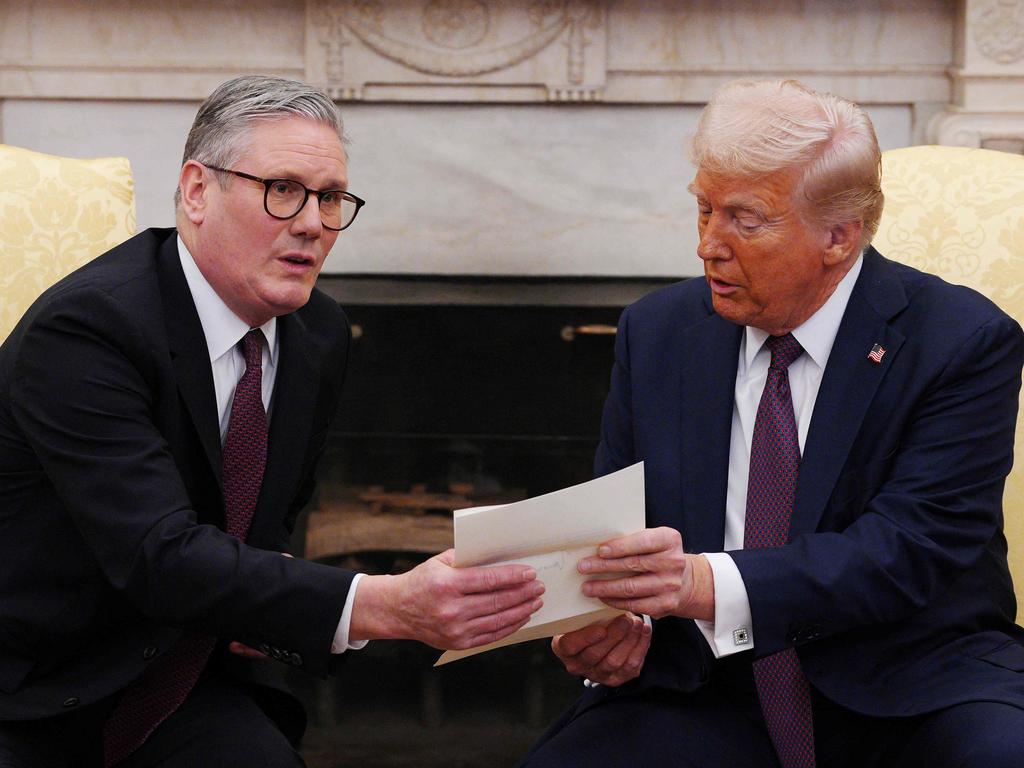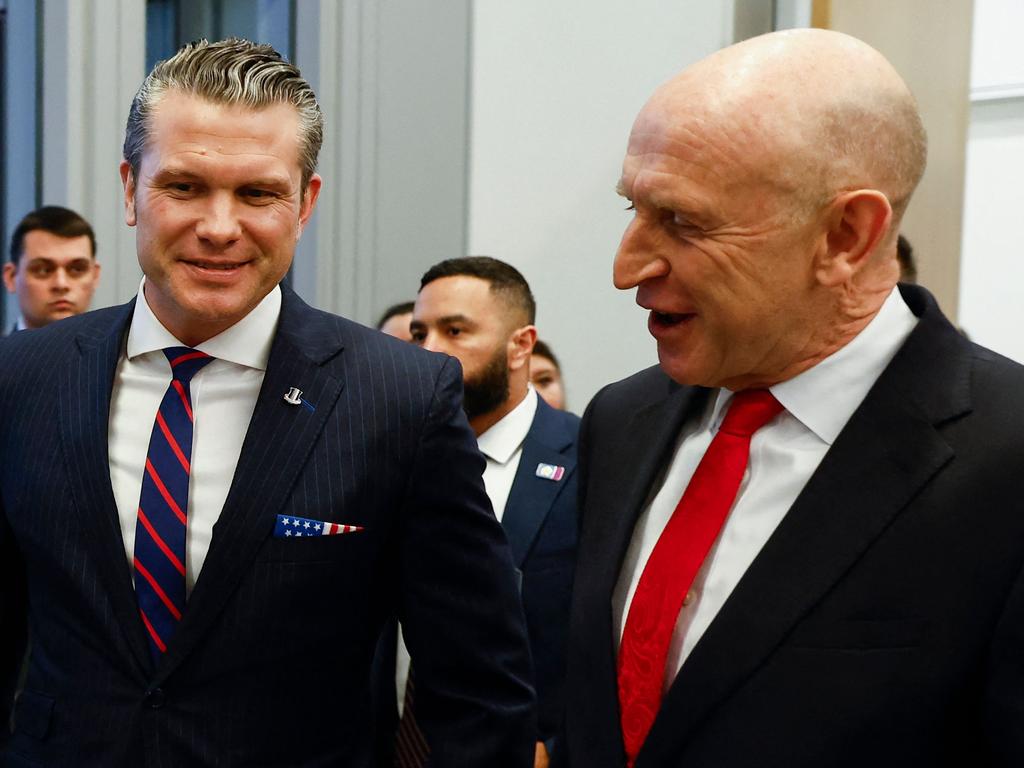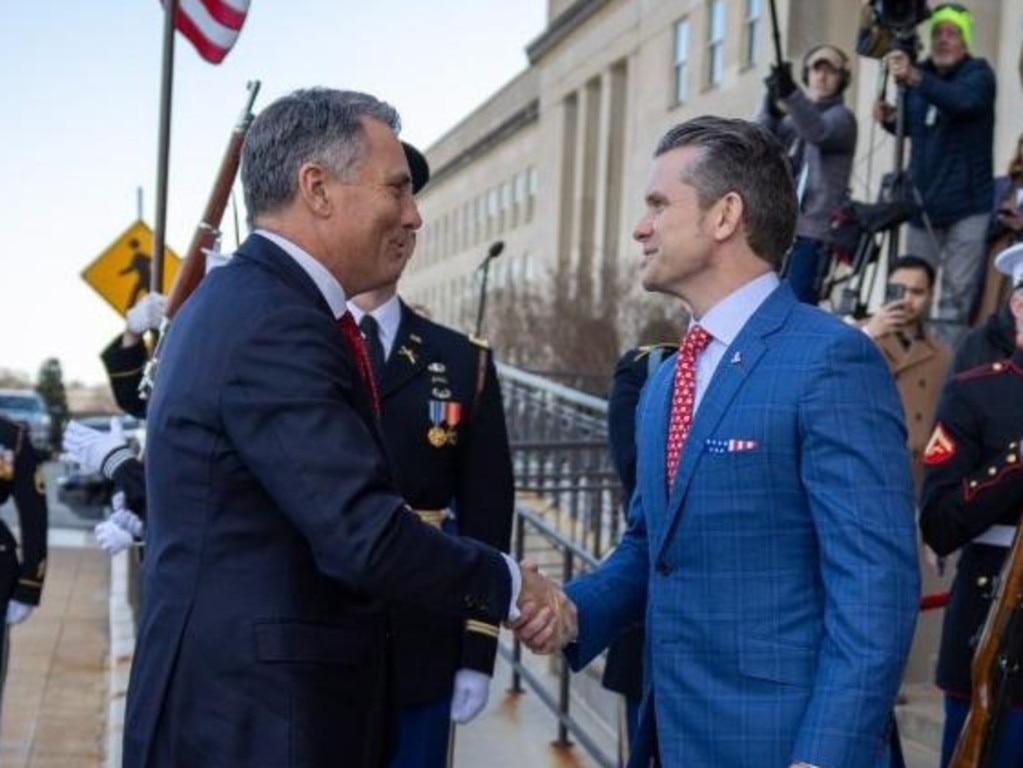‘What does that mean?’: Donald Trump makes startling AUKUS admission
Donald Trump has appeared briefly confused about what the AUKUS defence partnership is, before confirming he would discuss the arrangement in his meeting with British PM Sir Keir Starmer.

Anthony Albanese has moved to quell concerns Donald Trump may not be completely committed to the US-Australia nuclear-powered submarine deal, after the US President asked what the AUKUS trilateral security partnership was in an Oval Office press conference.
Mr Trump, who accepted a personal invitation from the King to make a state visit to the UK, was asked at one stage by British media about whether he would discuss the AUKUS agreement in his White House meeting with British Prime Minister Keir Starmer.
However, Mr Trump appeared confused by the question. After being told it was a defence partnership, the President confirmed that AUKUS would be discussed. He also defended the strength of the US relationship with Australia.
“Will you be discussing AUKUS with the Prime Minister?” Mr Trump was asked.
“What does that mean?” he replied.
“AUKUS – the Australia-US defence alliance.”
“Yeah, well, we will be discussing that. We’ve had another great relationship and you have too with Australia,” Mr Trump said looking at Sir Keir. “We’ve had a very good relationship with Australia.”

It was the second reference to Australia in his meeting with Sir Keir before the cameras; earlier Mr Trump said the US enjoyed several strong relationships, including with Britain, France and Australia. “We have a lot of good ones,” he said.
In Sydney the Prime Minister said those later comments were consistent with his discussions with Mr Trump about AUKUS, and suggested the President had merely been “thrown” by an acronym he did not pick up on.
“There’s a lot of acronyms in this business and, you know, we all get thrown at them from time to time,” Mr Albanese said.
“Look, Donald Trump went on to – I’ve seen President Trump’s comments together with Keir Starmer – he went on to speak about the really important and positive relationship with Australia. That’s consistent with the discussions that I’ve had with President Trump.
“That included, of course, talking about AUKUS, which we spoke about during both of our discussions.”
On Friday Peter Dutton also said there was “no doubt” in his mind that Mr Trump supported AUKUS, declaring that the US and Britain were Australia’s most “important partners”.
Sir Keir, who has pledged to increase defence spending to 2.5 per cent of GDP by 2027, thanked the US President for his leadership, saying they had already had a “very constructive conversation and I’m sure we will today”.
Both men went on to discuss a range of topics including the chances of securing a peace agreement in Eastern Europe. Mr Trump said he would take a “trust and verify” approach to his dealings with Russian leader Vladimir Putin.
However, Mr Trump said he did not think Mr Putin would try to invade Ukraine again following any deal.
“I think he’ll keep his word,” Mr Trump said. “I’ve known him for a long time now. We had to go through the Russia hoax together … I don’t believe he’s going to violate his word. I think the deal is going to hold.”
Ahead of Volodymyr Zelensky’s visit on Friday to Washington, where he is expected to sign a key minerals deal with the US, Mr Trump also appeared to backtrack from his description of the Ukrainian President as a “dictator without elections”.
Asked whether he stood by the description, Mr Trump replied: “Did I say that? I can’t believe I said that. Next question.”
However, on the key issue of whether the US would provide a security guarantee or a backstop to uphold any deal to end the war in Ukraine, Mr Trump made clear that Europe would be the first line of defence.
“Well, there is a backstop,” Mr Trump said. “You are going to have European countries because they are right there. We are every far away. We have an ocean between us.”
If the minerals deal with Ukraine was approved, Mr Trump said the US also would have people there “working in the country” – which would provide another kind of backstop to preserve security.
“We’re going to have a lot of people over there. So we’ll be working in the country. I just don’t think you’re going to have a problem. I think when we have an agreement, you can say whatever you want about security – who’s going to do it. That’s going to be a very pleasant conversation. The hard conversation is: will we have an agreement. And I think the answer is yes.”








To join the conversation, please log in. Don't have an account? Register
Join the conversation, you are commenting as Logout